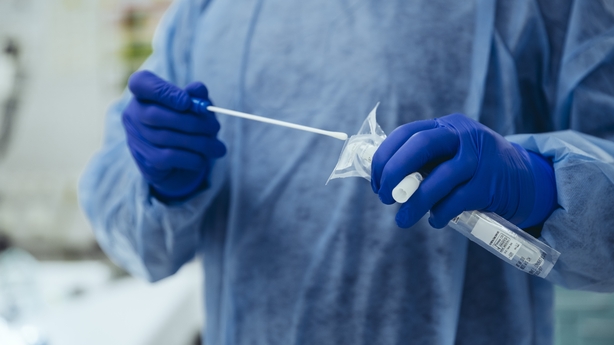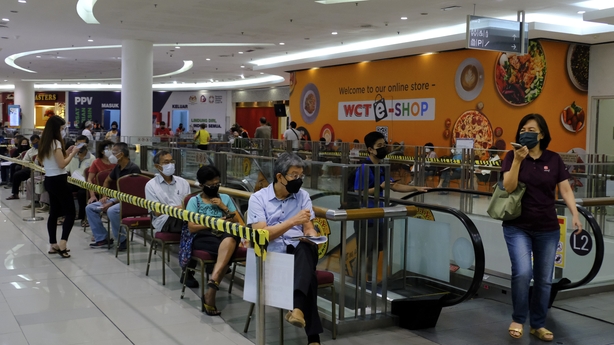Hong Kong has announced stringent new coronavirus restrictions and record new infections, while a shortage of vegetables added to the misery as truck drivers who tested positive for Covid-19 were unable to bring them from mainland China.
The Asian financial hub reported a record 625 coronavirus cases today, with cases likely to continue rising rapidly, authorities said. There were 2,600 infections over the past two weeks compared with just two in December.
Responding to the worrying trend, Hong Kong's leader Carrie Lam said public gatherings would be limited to two people from four currently, while churches and hair salons would close from Thursday, joining a slew of venues already closed.
She also announced a ban on private gatherings of more than two families, though it was unclear how authorities would enforce it.
"The time has come for Hong Kong to take some tough measures," Ms Lam told a news briefing.
Hong Kong's supply of vegetables was around one-third of yesterday's after several cross border truck drivers, who bring in produce from mainland China, tested positive, the government said.

Shelves stocking vegetables were bare across supermarkets in the city while crowds surged into fresh markets to snap up the limited produce available. Other food remained available.
For now, Ms Lam said, the best option was to adhere to the "dynamic zero" strategy employed by mainland China to suppress all coronavirus outbreaks as soon as possible.
The official Chinese Communist Party newspaper, the People's Daily, had encouraged Hong Kong to follow China's approach to containing the virus in an editorial yesterday.
"When vaccination rates increase, when Omicron disappears and when other things happen, we will revisit our strategy," Ms Lam said.
All the measures are being extended to 25 February, when the city's vaccine pass will also take effect.
People will need to be vaccinated to enter shopping malls, supermarkets and other venues, Ms Lam said. Government quarantine facilities are also nearing their maximum as authorities struggle to keep up with their rigid contact tracing scheme.
Many health experts have said the current strategy of shutting itself off as the rest of the world shifts to living with coronavirus, is unsustainable.
Doctors say mental health is suffering, particularly in families where people are earning less, or children cannot go to school due to the restrictions.
France to scrap Covid test rule for vaccinated travellers
France will soon drop its requirement of a negative Covid-19 test for vaccinated travellers from outside the European Union, Europe Minister Clement Beaune has said.
"We again required tests in December over the Omicron variant. In the coming days we will announce that tests are no longer needed for vaccinated people," Mr Beaune told France 2 television.
Currently anyone coming from outside the EU, including Britain, has to show a negative test result from the previous 48 hours, regardless of vaccination status.
"This week there will probably be a new European protocol for vaccinated people arriving from outside the EU, with eased measures," he added.
EU members agreed on 25 January to better coordinate their travel rules, in particular for people crossing borders within the bloc.
The Omicron surge prompted Italy and Denmark, for example, to impose recent negative test requirements for entry by fellow EU residents as well as vaccination proof, a tightening of the rules that irritated officials in Brussels.
French authorities began lifting a series of Covid restrictions this month, with nightclubs set to reopen from 16 February and standing areas once again authorised for concerts and sporting events as well as bars.
The country recorded 46,001 Covid cases yesterday, a sharp drop from the record of just under 465,000 infections in mid-January.
Chinese scientists say new virus test gives results within minutes
Chinese scientists say they have developed a new coronavirus test that is accurate as a PCR lab test but gives results within four minutes.
Polymerase chain reaction (PCR) tests are widely considered the most accurate and sensitive for the virus that causes Covid-19, but they usually take several hours.
Some countries have experienced severe backlogs in the face of heavy testing demand, fuelled by the spread of the highly transmissible Omicron variant.
Researchers from Fudan University in Shanghai say they have a solution.
In a peer-reviewed article published yesterday in the journal Nature Biomedical Engineering, the team said their sensor, which uses microelectronics to analyse genetic material from swabs, can reduce the need for time-consuming Covid lab tests.
"We implemented an electromechanical biosensor for the detection of SARS-CoV-2 into an integrated and portable prototype device, and show that it detected (virus RNA) in less than four minutes," the team said in the paper, referring to the official name of the Covid pathogen.
The researchers said their method offers speed, ease of operation, high sensitivity and portability.
Their trial involved taking samples from 33 people in Shanghai who were infected with the coronavirus, with PCR tests conducted in parallel.

The results from their method were a "perfect" match with the PCR tests, according to the article.
Their study involved testing the new method on 54 samples, which included people with fever who did not have the coronavirus, those with influenza, and healthy volunteers.
Those cases did not yield any false positives, the team said.
The Fudan researchers said that once developed, their testing device can be used for quick testing in a variety of situations, including airports, health facilities and "even at home".
PCR tests are not only slow, but they also require lab infrastructure that can be limited in many countries, reducing the number of cases that can be handled each day.
And while rapid diagnostic tests have now become available in many parts of the world, they are generally less accurate.
China is one of the world's biggest makers of coronavirus test kits.
According to customs data, it exported $1.6 billion worth of test kits in December, a 144% increase from the previous month.
Malaysia's Covid panel recommends full border reopening in March
Malaysia's coronavirus recovery council has said it has recommended a full reopening of borders as early as 1 March without mandatory quarantine for travellers, as part of plans to accelerate economic recovery.
The country has shut its borders since March 2020 and froze the entry of foreign workers to try to contain coronavirus outbreaks.
The recommendation comes as neighbours waive quarantine requirements to attract vaccinated tourists, including Thailand, which yesterday said it was eyeing travel bubbles with Malaysia and China.
Muhyiddin Yassin, a former premier and chairperson of the National Recovery Council (NRC), a government advisory body, said travellers would have to undergo Covid-19 screening before departure and on arrival.
"This means tourists can visit, investors can enter... It means AirAsia can fly again, as an example," he told a news conference, referring to the Malaysia-based budget carrier.

At present, Malaysia allows quarantine-free entry to people from Singapore as part of a bilateral arrangement.
Daily coronavirus infections in Malaysia have surged in recent weeks to their highest in four months, driven by the Omicron variant.
It reported 13,944 new infections today, adding to more than 2.9 million cases recorded overall, with over 32,000 deaths, among the highest fatality and infection rates in Asia per capita.
The majority of the cases were asymptomatic or mild due Malaysia's high vaccination rate, the health ministry said.
About 98% of Malaysia's adult population has received two doses of the vaccine and more than half a booster shot. About 89% of 12 to 17-year-olds have been vaccinated and inoculations for children age 5-11 started last week.

